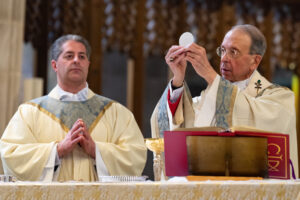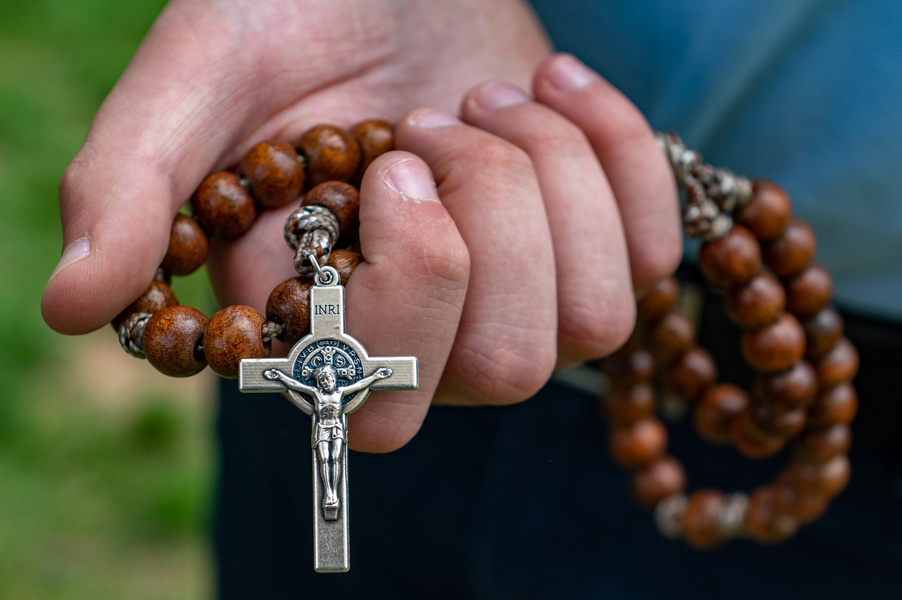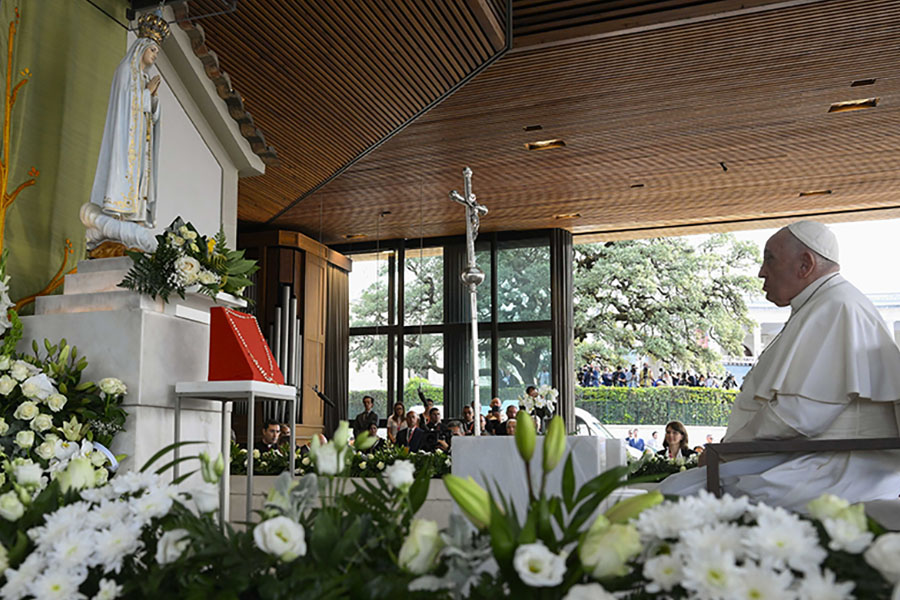The month of May is a time of special devotion to the Blessed Virgin Mary. In the meantime, the Church in the United States is engaged in a multiyear Eucharistic Revival, a project which aims to rekindle faith in the eucharistic mystery and increase participation in Sunday Mass.
Let me suggest that May devotions and the Eucharistic Revival are related. Mary, the “Woman of the Eucharist,” lived the eucharistic mystery in a singular way and shows us how to deepen our eucharistic faith.
The Acts of the Apostles relates that Mary joined the Apostles as they waited and prayed for the coming of the Holy Spirit at Pentecost (Acts 1:14). A bit later, Acts describes the life of the newborn Church at Jerusalem. It says that the members of the earliest Christian community “devoted themselves to the teaching of the Apostles, and to the communal life, to the breaking of bread, and prayers” (Acts 2:42). Many infer from this passage that Mary herself took part in the earliest celebrations of the Eucharist, listening to her Son’s teachings and recognizing him in the Breaking of Bread.
In an even deeper sense, Mary’s whole life was “eucharistic.” As we know, Mary conceived Christ in the power of the Spirit. Thanks to Mary’s consent, Christ the Incarnate Son entered human history to redeem us. So too, at every Mass, Mother Church brings forth Christ anew, in the power of the Holy Spirit. In the celebration of the Eucharist, Christ remains with us, truly and substantially present – body, blood, soul and divinity.
Not only did Mary conceive Christ in the power of the Spirit; she also followed him, listening to his words and putting them into practice. Her motherhood and discipleship led her to the Cross where she shared deeply in her Son’s redeeming sacrifice, more deeply than anyone else. Mary lived the Paschal Mystery that we encounter and celebrate in the Eucharist.
Mary also teaches us how to respond to the eucharistic mystery: with charity, faith and joyful thanksgiving.
Learning that her cousin Elizabeth had conceived in her advancing years, Mary rushed to her side. She came in a spirit of charity and loving service that were the first fruits of the Lord’s presence in her womb. In the Eucharist, we share in Jesus’ redeeming love, love in its purest form, and thus charity must be the fruit of our participation in Holy Mass.
Elizabeth, Mary’s cousin, captures Mary’s pure and deep faith when she says, “Blessed are you who believed that what was spoken to you by the Lord would be fulfilled” (Lk 1:45). We too must have faith to participate fruitfully in the Eucharist, “the mystery of faith.” We must believe in the truth and reality of the Lord’s presence and in our mysterious sharing in his death and resurrection. Just as Mary said “yes” to her vocation as mother of the Savior, so too we must say our “yes,” our “Amen,” when we receive our Lord in holy Communion.
Mary also exemplifies a spirit of praise and thanksgiving. Encountering Elizabeth, Mary uttered her beautiful prayer of praise and thanksgiving, the Magnificat. Her words echo through the ages: “The Lord has done great things for me and holy is his name” (Lk 1:49). As we encounter the Risen Lord in the Eucharist, our spirits should be one in magnifying the Risen Lord, in giving him thanks and praise. Indeed, the prayers of the Mass are saturated with a spirit of praise and thanksgiving and Mary teaches us how to make those prayers our own.
During the month of May, let us ask Mary, the Mother of the Church, to renew us in our belief and devotion to the mystery of the Eucharist.
Read More Commentary
Copyright © 2023 Catholic Review Media







